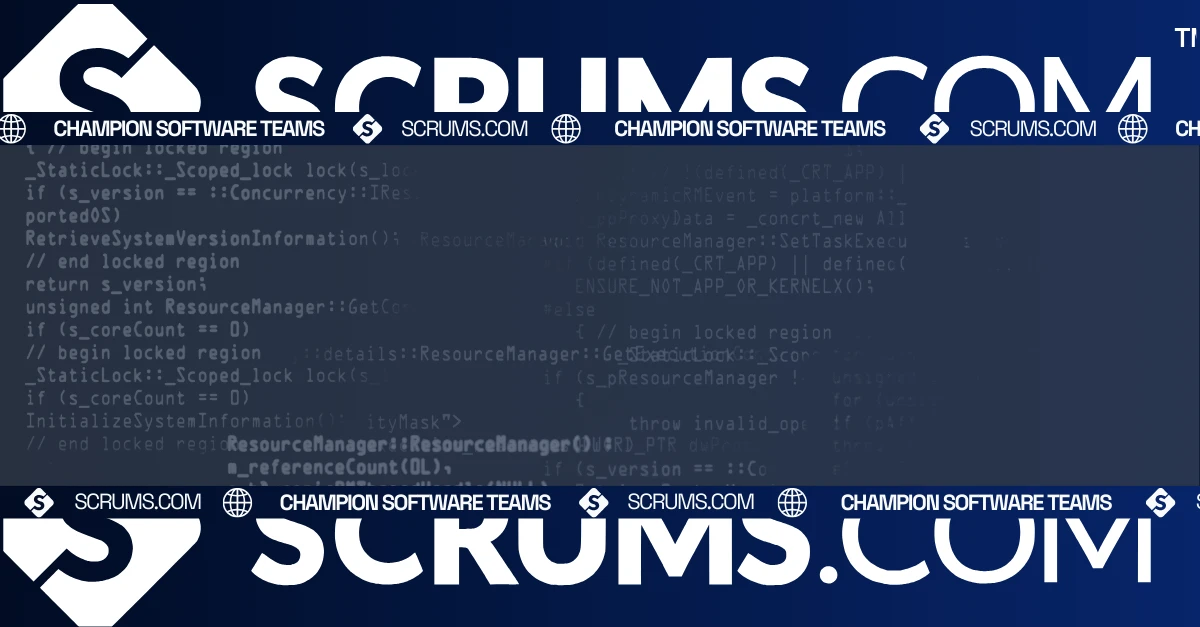Hire Next.js Software Developers
Scrums.com's 8,500+ software developer talent pool includes experts across a wide array of software development languages and technologies giving your business the ability to hire in as little as 21-days.
Trusted by 400+ global companies
















Hire a Next.js Developer for Cutting-Edge React-Based Web Solutions
Looking to streamline your web development process while boosting performance and SEO? Hiring a Next.js developer is the smart choice. Next.js, an open-source React framework, is rapidly becoming the go-to solution for creating highly performant, scalable applications. Businesses across e-commerce, SaaS, and media rely on Next.js experts for its server-side rendering (SSR) capabilities, static site generation, and optimized performance, which reduces page load times and improves user experience.
By opting for Next.js developers, companies can efficiently create React-powered web applications that are server-rendered and deliver impeccable user experiences.
Why Next.js Matters for Your Business
Next.js provides the best of both worlds by combining the React library for building fast, interactive UIs with powerful, scalable server-side rendering. As a result, Next.js experts can create highly efficient, SEO-optimized applications that offer faster initial loading times, which directly impact your website’s performance and user engagement.
According to Web.dev's study, 53% of mobile users leave a page if it takes longer than three seconds to load. Next.js developers can counter this problem with server-rendered, lightweight, and high-performance web apps, ideal for mobile and desktop viewers alike.
Key features of Next.js that dominate the modern development landscape include:
- Automatic Static Optimization for faster initial page loads.
- SEO-Friendly thanks to server-side rendering and static page generation.
- API Routes that allow for seamless integration of back-end services with front-end rendering.
If you’re looking to hire a Next.js developer for server-rendered applications in the USA , now is the time to choose this future-proof technology.
Key Benefits of Hiring a Next.js Developer
When you hire a Next.js developer, you gain access to numerous business advantages stemming from the framework's robust set of features and its versatile integration capabilities. Here are the top benefits:
- Improved Performance & SEO: Next.js’ server-rendering provides content to users faster, offering a better user experience and improving your website’s SEO. Google’s Core Web Vitals report revealed that 53% of sites underperform in terms of SEO due to slow page loading times. With server-rendered applications, your content will be indexed properly while ensuring high-speed performance.
- Scalability: Whether you're running a small-scale e-commerce website or a rapidly growing SaaS platform, Next.js developers ensure that your web application scales seamlessly due to its modular, flexible architecture.
- Unparalleled Flexibility: Next.js comes with no out-of-the-box assumptions, making it the perfect choice for both single-page applications (SPAs) and content-heavy websites. From static site generation to full-stack solutions, Next.js experts can customize the framework to fit your specific business needs.
- Enhanced Security: Next.js’ static page generation reduces dependencies on databases and external APIs at runtime, shrinking the attack vector for potential vulnerabilities. By hiring Next.js developers, you ensure more secure and robust applications for your business.
- Full Integration with React: Next.js complements and extends React.js, a library used by over 40% of developers worldwide. If you wish to offer a more dynamic, interactive user experience, Next.js experts for React-based web solutions are your best option.
Core Competencies of Skilled Next.js Developers
Choosing the right Next.js developer is crucial to the success of your project. When hiring a Next.js developer, ensure they possess the following core competencies:
- Proficiency in React.js: Since Next.js is built on top of React, a quality developer should have deep expertise in JavaScript/JSX, hooks, components, state management, and integrating React libraries like Redux and React Router.
- Server-Side Rendering (SSR): One of Next.js' standout features is SSR, where developers automatically pre-render pages. A professional Next.js expert should know how to write efficient code for server-rendered applications to improve content crawlability and performance.
- Static Site Generation (SSG): Developers should know how to build static content sites by leveraging Next.js’ Static Site Generation capabilities, ideal for content-heavy websites and blogs.
- API Integration & Routing: A skilled developer must be proficient in setting up internal and external APIs using Next.js' API routes to create robust, data-driven applications.
- Headless CMS Integration: Many businesses combine Next.js and headless CMS platforms like Contentful, Prismic, or Sanity for advanced content management. Your Next.js experts should be capable of integrating these systems fluidly.
- Understanding of Vercel Deployment: Since Vercel is the company behind Next.js, developers should be comfortable using Vercel for deploying, scaling, and optimizing applications for production.
Common Applications of Next.js in Modern Development
Next.js stands at the forefront of modern web applications, broadening its utility across various industries and types of applications. Some of the most frequent use cases include:
- High-Performance E-commerce Solutions: Many e-commerce businesses hire Next.js developers to build fast, SEO-optimized online stores that offer real-time pricing updates, product filtering, and lightning-fast checkout experiences.
- Scalable SaaS Platforms : With Next.js, SaaS companies can build applications that scale effortlessly by leveraging static-generation and server-side rendering to ensure responsive and efficient user interfaces for dynamic data handling.
- Static Content Websites : Blogs, news platforms, and content-heavy websites benefit from static site generation (SSG), which allows for faster rendering and load times, providing users with almost instantaneous content access.
- Corporate Websites and Landing Pages: Whether it’s a showcase landing page or a portfolio website, businesses hire Next.js experts to deliver pages that load rapidly and are SEO-optimized.
- Progressive Web Apps (PWAs): With integrated React support and Next.js' ability to render pages server-side, Next.js developers can create highly interactive, mobile-first experiences that function offline, scale operation environments, and improve overall code resilience.
Comparing Next.js with Other JavaScript Frameworks: Why Choose Next.js?
If you're deciding between different JavaScript-based frameworks, you may wonder why Next.js stands out. Here's how it compares with the likes of Gatsby.js, Nuxt.js, and plain React:
- More SEO-Friendly than Gatsby.js: Gatsby relies heavily on static content generation, which might not be suitable for all businesses, especially those requiring server-side dynamic content rendering. Next.js experts offer a better approach by combining SSR with static generation, ensuring better SEO performance.
- Easier Setup than Nuxt.js: While Nuxt.js excels in the Vue.js ecosystem, it demands more setup time. Next.js, on the other hand, shines in the React-based ecosystem and provides out-of-the-box configurations ideal for rapid development.
- Full-Stack Advantages Over React: Although React is a powerful library, it only handles the view layer of applications. Next.js offers a full-stack solution with routing, SSR, SSG, and API setup baked in, making it a superior choice for complete web app development.
If your project requires fast delivery, dynamic functionality, and scalability, hiring the best Next.js developers for high-performance websites gives you an edge in deploying cutting-edge solutions on time and with superior quality.
The Future of Next.js Development: Why It Continues to Grow
Next.js continues to rise in popularity due to its unique ability to handle the complexities of modern web development. Here’s how the framework is evolving:
- Focus on Performance: Accelerating load times and delivering smooth interactive experiences are central to Next.js' development. Vercel, the company behind Next.js, is continuously investing in optimizing the framework’s performance.
- Serverless Architecture: As businesses move towards serverless ecosystems, Next.js integrations with platforms like AWS Lambda and Vercel provide highly scalable serverless solutions.
- Wider Adoption in Large Enterprises: According to a 2022 JavaScript survey, over 60% of developers who use Next.js are working on enterprise projects. This shows that the demand for Next.js developers will continue to grow, especially in large-scale application development.
- Integration with JAMstack: Next.js perfectly aligns with modern JAMstack development, making it increasingly popular for businesses focusing on static site generation and decoupled architectures.
How to Hire the Right Next.js Developer for Your Project
Finding the right professional for your project doesn’t need to be an overwhelming task. Follow these steps to hire top-tier Next.js developers for hire:
- Evaluate Project Needs: Clearly define the scope of your project—whether you need server-rendered applications, static site generation, or API integrations. Choose a developer with relevant experience.
- Look at Relevant Experience: Review portfolios and case studies that highlight experience in creating SEO-optimized, high-performance web apps using Next.js.
- Test Server-Rendered Expertise: Make sure the developers are skilled in server-rendered applications , which boost performance and offer the edge your app needs to stand out.
- Assess Communication: Ensure that the Next.js developer is capable of efficient communication, especially when working with distributed teams or in agile environments.
- Consider In-House vs. Freelance: Depending on your project size and budget, decide whether to hire an in-house developer or work with freelancers or development agencies specializing in Next.js.
Don't Just Take Our Word for It
Hear from some of our amazing customers who are building with Scrums.com Teams.
Find Related Software Developer Technologies
NestJS developers
Vue.js developers
AngularJS developers
Javascript developers
Meteor developers
How to Hire Software Developers with Scrums.com
Align
Let us get to know your business. Book a free consultation and tell us about your tech talent requirements.
Review
Our teams will look at the current culture and requirements of your business and match quality tech talent that best suite your teams.
Meet
Meet your tech talent. We have a 33% acceptance rate as we pre-qualify suitable talent to ensure they meet your needs.
Kick-Off
Once we have agreed on the best way forward, we will start the contract closure process. Once that's done - We can kick-off!
Explore Software Development Blogs
The most recent trends and insights to expand your software development knowledge.










